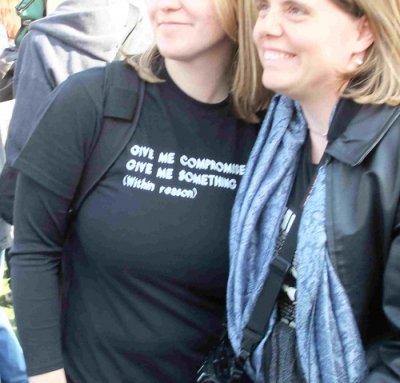Compromise in Relationships – the Good, the Bad, and How to Tell the Difference

photo by Chris Liverani
by Andrea M. Darcy
Unless you are dating or friends with your own personal clone, you are going to at some point face a difference of opinion. How you compromise in relationships will either make or eventually break your connection.
Define compromise in relationships?
Compromise in relationships is about meeting in the middle.
You find a solution that might not be exactly what you want, or they want, but is the closest to pleasing you both than other available options.
You want to stay home and watch a film, they want to go out dancing. You compromise by going out to the theatre. They get out of the house and get to be around people, you get to escape into a story. Your needs are met.
Of course compromise in romantic relationships can be about much bigger issues. It can be about having children, getting married, and where you end up living.
Good compromise, bad compromise?
- Do you feel connected, like you and the other worked as a team?
- Is there a feeling of trust and security with this decision?
- Or even excitement at a new way forward you hadn’t considered?
- Will this compromise actually get done? Does it feel solid and truthful?
Then it’s a good compromise. Good compromise is an energised advancement. And it’s a ‘we’ thing that is good for mental health.
Research at the university of Taiwan showed that the more individuals have a relational focus (i.e., a greater use of “we”) while narrating their experiences of compromise with family, the better psychological health they will experience.

photo by: Fred Moon
But what if you don’t feel that way at all? If you feel exhausted by the decision made, or pushed?? Or sense that the other person agreed too quickly, and is now angry with you? It might not be compromise at all.
Compromise and codependency
- Do you feel you’ve made a ‘sacrifice’ with the compromise?
- Did you constantly ask the other, ‘what works for you’?
- And feel anxious if they don’t seem happy with the outcome?
- Does the compromise mean your own needs are put aside? And meet more of your partners requirements than yours?
- Does the outcome make you feel tired or secretly grumpy?
That same Taiwanese study points out this sort of ‘compromise’ is bad for mental health. “Compromising, which includes accommodating and sacrificing, may also lead to anxiety and depression.”
And it’s really just codependency, where you gain your sense of self not from within, but from without. From how others see you and respond to you.
Control over compromise
Sometimes we think we are great at compromise. But we are actually engaging in control of our friend or partner.
- Do most of the ideas come from you?
- Do you talk more than you listen, and is it you who announces the final decision?
- Does the other person act quiet, withdrawn, or sullen after?
- Do they then not to what you agreed to, or even sabotage things?
Why do I struggle with compromise in relationships?
A struggle with compromise can be related to your ‘attachment style‘. Attachment theory suggests that we need at least one caregiver to provide reliable and consistent unconditional love and safety when we are children. Otherwise we develop issues with how we connect and relate.
Research by psychologists Collins and Read confirmed that if we had steady care and end up with ‘secure attachment’, then we find the trust and commitment in relationships easier, both which make compromise easier.
Anxious attachment, on the other hand, leads to issues with compromise. A study looking at how young men choose partners confirmed that those with anxious attachment were the least willing to compromise. Anxious attachment leads to, “relatively low self-esteem and a tendency to overassess situations as threatening, irreversible, and uncontrollable,” as well as seeing partners as unresponsive to your needs and unreliable.
The one thing we really can’t compromise on

By: Martha Soukup
Personal values are the things we deep down hold as important when everything else falls away. And they are intrinsic, not really things that change much over our lifetime.
If you are constantly bickering in your relationship and can’t find a compromise, it can be a case of different values.
If you deeply value stability, and the other deeply values adventure, compromise might just leave you both miserable. And if you value family but your partner values freedom, then the question of children will be a constant clash and leave one person feeling bitter.
If values aren’t shared, relationships are tricky. Sometimes, if we can’t agree to disagree, we need to accept that there will always be limits. Or even that’s it not really the right relationship to be in.
How can I be better at compromise in relationships?
1. Recognise your needs.
How can you compromise if you aren’t really sure what you are after? And yet that’s what many of us try to do. We grow up in families where our needs were overlooked or dismissed, and have to learn how to recognise what we need. Journalling can help, as can mindfulness and working with a therapist.
2. Communicate your needs clearly.
Of course we then have to be honest about what those needs are. It can be scary at first to share what we need if we’ve grown up pleasing others, but with practise it get’s easier.
3. Identify your personal values.
Again, personal values are the lines in the sand, the things we really can’t cross without suffering. Put time into identifying what yours are, so you know where how far your negotiating can go.
4. Listen carefully to the other person.
Compromise in relationships is about you both getting your needs met. Learn to fully listen to the other, with an empty, present mind. Reflect back if you aren’t sure. Ask good questions beginning with ‘what’ and ‘how’ if you need more information (avoid ‘why’ which can sound accusatory).
5. Be open to being wrong, a key to compromise in relationhips.
If a discussion rolls into blame and right/wrong, then it’s not going toward compromise but towards conflict. It’s okay to make mistakes when trying to find ways forward.
And when all else fails…..
Before you decide to throw in the towel on a romantic relationship, consider couples counselling. Often an inability to compromise in relationships comes from communication issues. A relationship counsellor will help you recognise what you both really want, and help you communicate in ways that move you forward instead of tear you apart.
If you know deep down the issue comes from you, and you recognise yourself in the description of anxious attachment and know the parenting you received was lacking? Then consider personal counselling. Not only will your relationships prove, but so will your self-esteem and clarity on what you want from life.
Ready to get the support you deserve? We connect you with highly rated and experienced London-based talk therapists and couples counsellors. Or use our booking platform to source UK-wide therapists and online counsellors you can access from anywhere in the world.
Have a further question about compromise in relationships? Or want to share your own tip with other readers? Use the comment box below.
 Andrea M. Darcy studied counselling and has since written over two thousand articles on mental health. Once a serious codependent over-compromiser, she knows the value of a fair agreement. Find her @am_darcy
Andrea M. Darcy studied counselling and has since written over two thousand articles on mental health. Once a serious codependent over-compromiser, she knows the value of a fair agreement. Find her @am_darcy




